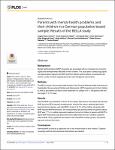Parents with mental health problems and their children in a German population based sample: Results of the BELLA study
Plass-Christl, Angela
Haller, Anne-Catherine
Otto, Christiane
Barkmann, Claus
Wiegand-Grefe, Silke
Hölling, Heike
Schulte-Markwort, Michael
Ravens-Sieberer, Ulrike
Klasen, Fionna
Background: Mental health problems (MHP) of parents are associated with an increased risk of psychological and developmental difficulties in their children. This study aims at analyzing population-based data of parents with MHP and their children and the effects of associated risk factors in order to further targeted preventive and therapeutic interventions. Methods: The BELLA study is the mental health module of the German National Health Interview and Examination Survey among Children and Adolescents. MHP in parents and in their children as well as associated risk factors were examined in a sample of N = 1158 parents with children aged 11 to 17 years. Results: Parental MHP were identified in 18.6% of the sample. Risk factors associated with parental MHP were low SES, parental unemployment, stressful life events, parental daily strain, parental chronic disease, and child MHP. A rate of 19.1% of the children of parents with MHP reported MHP themselves, the corresponding rate among children of parents without MHP was 7.7%. In multiple regression analyses the risk for children of parents with MHP to report MHP themselves was almost two times higher than the risk of children of parents without MHP. Other significant associations with child MHP included gender, the parents’ age, and stressful life events. Conclusions: Parental MHP constitute a significant risk for the mental health of their children. Targeted screening methods and preventive interventions are needed.
Files in this item
No license information

